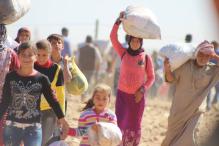The Managing Exits from Armed Conflict (MEAC) project was started at UNU-CPR in late 2018 and in January 2023 MEAC transitioned to the United Nations Institute for Disarmament Research (UNIDIR). UNU-CPR remains actively engaged in the project through its steering group. From its institutional home at UNIDIR, MEAC is working to build on the geographic and thematic growth that the initiative achieved at UNU-CPR while benefitting from UNIDIR’s institutional knowledge on micro-disarmament, conventional weapons flows, and gender perspectives.
All research outputs from the MEAC initiative are available on the UNIDIR website.
The MEAC initiative is a multi-year collaboration to develop a unified, rigorous approach to examining how and why individuals exit armed conflict and evaluating the efficacy of interventions meant to help support their transition to civilian life.
The project is supported by the Norwegian Ministry of Foreign Affairs, Switzerland’s Federal Department of Foreign Affairs (FDFA), the UK Foreign Commonwealth and Development Office (FCDO), Irish Aid, UNDP, and is being run in partnership with DPO, UNICEF, IOM, and the World Bank.
The United Nations and its partners have long provided, and supported, a range of interventions to help groups and individuals exit armed conflict, resolve violent conflict, and build sustainable peace (e.g., DDR, stabilization interventions, community reconciliation, child reintegration programming). Yet, despite decades of programming, there is a significant knowledge gap as to which approaches work effectively in facilitating and bolstering conflict transitions and under which conditions. This scarcity of knowledge undermines effective international efforts to resolve conflicts and build peace (as well as conflict prevention efforts); presents challenges for crafting coherent mandates and effectively allocating resources; and ultimately, increases the likelihood of recidivism and conflict resurgence. As practitioners are asked to apply their tools in ongoing and “new” conflict contexts, characterized by groups designated as terrorist or labelled as “violent extremist”, this lack of knowledge carries increased risk.
The MEAC initiative seeks to redress this knowledge gap by rolling out an Agreed Assessment Framework for examining conflict exits and assessing programmes meant to support them. This Framework was developed with UN partners, researchers and M&E experts, Member States, and other key stakeholders over a ten-month collaborative process. The Framework lays out a converging vision for what constitutes full and permanent exits from armed conflict, identifies the key factors that sustain or characterize such transitions, and outlines how to rigorously assess them. During Phase II (2020-2022), the Framework and accompanying assessment tools will be pilot tested in several countries over a multi-year period and further refined before it and the accompanying survey tools are made available as public goods.
The MEAC initiative offers tactical and strategic benefits. For practitioners on the ground, it will allow for empirically-driven programme design and real time tailoring to ensure efficacy. With each round of data collection in the pilot study, practitioners will be provided with sophisticated analyses of the results (e.g., nuanced studies on the gender dimensions of exiting armed groups), which will support efforts to tailor programming in real time. At the strategic level, the cross-programme, cross-agency lessons that emerge from a common, rigorous evidence base will support more effective conflict resolution and peace building efforts, including more impactful resource allocation and mandating.
The MEAC project comes at a critical time: with the expansion, proliferation, and internationalization of civil conflict and the changing structure and nature of the armed groups involved, it is essential to find ways to support individuals and communities trying to distance themselves from the battlefield and improve their chances of successful transitions to civilian life. Ultimately, equipped with a stronger evidence base on the factors and interventions that facilitate exits from armed conflict, and conflict transitions more broadly, the international community will be better able to prevent violent conflict outbreaks and interrupt conflict cycles.
- Project team
- Siobhan O’Neil Kato Van Broeckhoven


